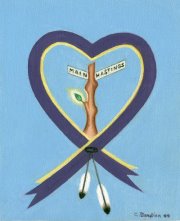How is it — simultaneous with a Missing Women inquiry that excludes the families of many hundreds of missing and murdered Aboriginal women — that this nation has learned the names of Zainab, Sahari, and Geeti Shafia, and Rona Amir Mohammad, as the only newsworthy examples of women murdered in Canada? This is a question of honour: in a nation that has shown itself incapable of respecting the dead, how do we honour the memories of women killed by their families? And what is the etiquette for “remembering” people we meet only posthumously? How do we honour the fullness of their lives?
It is a pressing question, in a nation of staggering death: somewhere up to 3,000 Aboriginal women have been murdered or abducted in Canada. For decades, loved ones reported their disappearances to law enforcement, but were ignored, despite growing bodies of corroborating evidence, leading to allegations of a “police cover-up.” Meanwhile, the very inquiry that was supposed to investigate the systemic failure of the police to uphold public safety has not only knowingly ostracized the families and communities of the deceased, but has also demonstrated a bias in favour of protecting the police. This leaves little room to address past mistakes and less so to prevent future deaths.
One significant way we can, with due respect, remember these women at the heart of this struggle to find missing justice, must be by helping their bereaved tell the stories of life that contest the roll calls of death into which their loved ones have been reduced. This means not only holding sham inquiries to account and attending events like the February 14th Annual Women’s Memorial March (which, now in its 21st year, is being held in at least 13 different cities), but also working with Aboriginal communities to ensure their safety and well-being in the face of the historic and ongoing racism and colonization upon which Canada was founded. Indeed, contrasted with the judicial and popular fixation on the alleged “barbarism” of the Shafia murders, one has to assume Canada believes the mass murders and disappearances of Indigenous women are “civilized.”
While so many Indigenous women are utterly dismissed by the state even in death, the Shafia sisters and their aunt are remembered, but mainly as dead. The wanton disregard for any narrative that perceives them as greater than the manner and moments of their deaths is sadistic. It is incompatible with the kind of posthumous reception any of us would want for our own loved ones. Yet the Shafia sisters are survived by siblings who must live on in a world where their sisters’ names have become synonymous with great tragedy and shameful stereotypes.
Thus, in a nation whose bureaucracies actively seek to erase those deaths that trouble its image as the epitome of multicultural tolerance, the only way we can commemorate the deaths of girls and women like the Shafia sisters and their aunt — the only way we can honour all our dead, all our sisters and all our mothers — must be by demanding better for all the living. We must hold our governments, our communities, and our families accountable. We must not fetishize some deaths so much that we let ourselves be distracted from the fact that every instance of domestic and gendered violence in Canada is indicative of the pervasiveness of violence against women. We must protect each other, and we must speak up against all oppression. All our peace and all our stories are caught up in each other.
As Rienzi Crusz writes:
You must know
that the silence of emptiness
is no silence, it is a wordless thunder
the hammers of the heart beating
with long-ago laughter
or stories grave and grieved.
Peace to all the dead, and strength to all the bereaved.
Fathima Cader is a Toronto and Vancouver-based writer, photographer, and law student involved in community organizing around race and gender equity.
Dear rabble.ca reader… Can you support rabble.ca by matching your mainstream media costs? Will you donate a month’s charges for newspaper subscription, cable, satellite, mobile or Internet costs to our independent media site?



